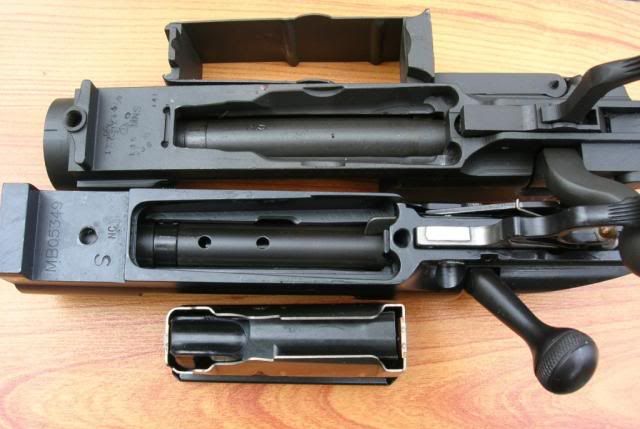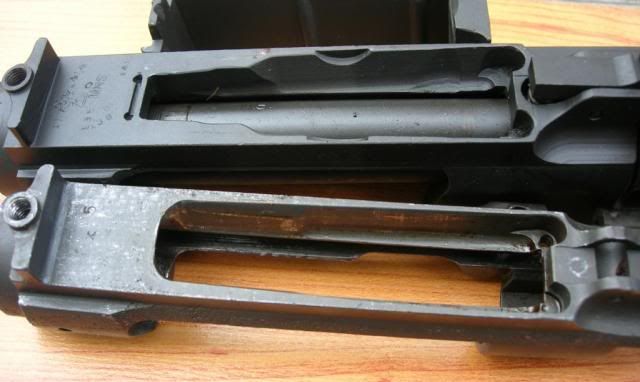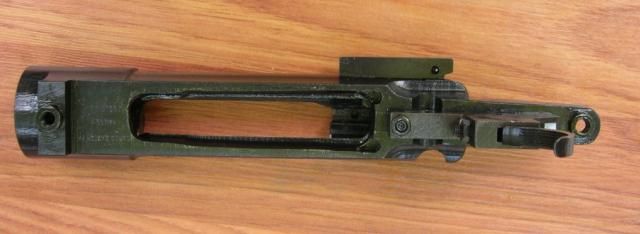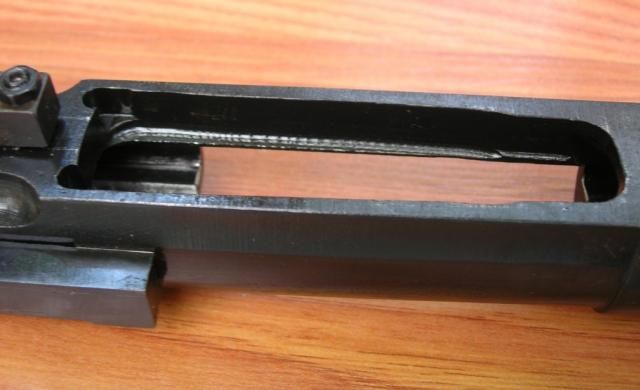29 March 2015, 14:27
Brian564What caused this jam?
http://www.youtube.com/watch?v=whONoc09xF0At 0:31 second the rifle, which I believe is a controlled feed Mauser style, jams. What could have caused this in a rifle that's supposed to have a highly reliable feed system?
To me it appears his loading method caused the jam, it happens even with a CRF sometimes.
29 March 2015, 16:45
postoakAs he moves the bolt forward, he appears to be pressing down on the bolt handle, causing the bolt face to be raised and canted in relationship to the cartridge. I wonder if this is the cause.
29 March 2015, 18:27
Jerry LilesI suspect the magazine feed rails need work.
29 March 2015, 18:35
jeffeossolikely the last round popped out -- could be mag spring, or other mag geometry issues -- but it could also have been a weird bolt stroke that bounced or bobbled .. or some other form of short stroking
29 March 2015, 19:55
shootawayJudging from what I see I think he may be trying to feed a large flat meplat solid or his rifle is not in order in that some screws are loose and things have become unaligned.
29 March 2015, 20:39
BlacktailerMy M70 had a tendency to do the same when I shot 350gr Woodleighs and loaded them close to the lands. Even though they fit in the magazine and cycled under normal conditions the second shell tended to do just that under stress like second shot on a buff.
Fix was a little polishing and loading them to factory OAL.
29 March 2015, 21:21
customboltBrain564. Not to sound coarse. But, the actions' Mauser style alone will not "make it work". GMA actions are not ready to go right out of the box. It needs to be tweaked by a gunsmith properly especially if the parts are sized for a slightly different cartridge such as .416 to .450.
My novice guess is that the follower needs some attention at the rear.
Sorry gentlemen. Can't go for the operator error. Something needs more tweaking.
30 March 2015, 23:37
Brian564Thanks! These are some of the best actions available, so I didn't associate them with the post about needing tweaking to work.
31 March 2015, 04:21
customboltBrian, If you were considering purchasing a large bore, you might get some really good input on the -big bore rifles- thread. Many top builders and big bore shooters frequent that section. Also see -gunsmithing-.
31 March 2015, 07:22
SlamFireIn so many ways our culture is a creation of Corporate advertizing bureaus and since we read the same gun magazines, which are totally beholden to their corporate advertisers, if you only read commercial publications your education is merely that which will get you to buy things. The Mauser claw extractor is a design feature not an end in itself. Cartridge feed is a very complex series of events, movements, that involve cartridge taper, cartridge diameter, feed angles, cartridge orientation, cartridge release, magazine width. There are probably a few more that I can’t remember. Cartridge feed was very carefully considered in military bolt actions. Given lots of study of cartridge external dimensions and the internal dimensions of the action, with interaction between designers, militaries created very reliable feed mechanisms . Commercial actions are a sort of one size fits all, and I am very certain that only cursory attention was paid to studying feed and extraction dynamics for obscure cartridges. Reading Ottensen’s books of the Bolt Action, it is obvious that some commercial actions made it on to the market where very little attention was paid to feed and extraction for even standard chamberings.
This is a comment you don't have to agree, but being a target shooter, I am of the opinion that the average shooter does not put enough rounds down range to really have a good assessment of the reliability of their actions. Actions that are unreliable in feed and extraction are quickly junked by across the course shooters as forty out of eighty shots are fired in rapid fire with a reload. Given the time and effort to get to a match, then you spend all day there, a rifle that misfeds and ruins the owner’s score is not tolerated for long. I really doubt the average shooter ever fires as many rounds through his rifle, for the time that he owns it, as does an NRA competitor does in one month. If they did so, we would not be seeing videos of failures to feed or eject with commercial rifles, as shooters would not tolerate such unreliability.
A feature that I like, that is common to all the old military bolt actions, is milled feed lips. The receivers of these actions have contours milled into the receivers which are timed for cartridge release. These are feed lips and the actual orientation of the cartridge at release is extremely important for reliable feeding. Unlike modern actions with cheap stamped metal boxes, these feed lips don’t move, don’t bend, are extremely hard to wear out, and thus, provide the most reliable means of feed of any system.
Of course milled receiver feed lips are specific to the class of cartridge being used, but they last the life of the receiver.
This a P14 Enfield action and a modern FN PBR M70 action. The Enfield action is clearly milled for a rimmed cartridge. The M70 requires that magazine box, of three rounds, while the Enfield can have five or six rounds (30-06) in the magazine.

Here you can clearly see the feed lips cut into the P14 Enfield and a M1903 Springfield receiver.

The Dumoulin Mauser action has milled feed lips.


Building in accurately aligned feed lips and studying cartridge timing and release costs time and money and you don’t see these features in most modern rifles. For a commercial rifle that shoots a number of different cartridges about the only thing that changes between cartridges of the same length is the lip bend angle of the sheet metal box magazine and maybe the follower. Sheet metal box magazine lips may not be the optimum feed device for some cartridges. I did look at the cartridge being used, it was fairly straight, shallow shoulder. I am not a fan of straight cartridges as they don’t steer well and then the addition of a shallow shoulder just exacerbates the problem.
What exactly caused the problem, I don’t know. More shots would have to be fired with a slow motion camera focused on the magazine. But rest assured, a claw extractor cannot cure sloppy cartridge orientation or poor cartridge release timing. An extractor is an extractor, not a cure for shoe string engineering development budgets.
31 March 2015, 21:43
Idaho Sharpshooterthank you for the pictures, and education.
Rich
31 March 2015, 22:28
Brian564Can someone use photoshop to point out the "feed lips" in the actions? This great post is quite interesting, but I won't comprehend it unless I knew which parts are the feed lips. Sorry, I must have fired thousands of rounds, but know zero about engineering aspects

01 April 2015, 06:44
SlamFireBecause it is so time consuming, I am not interested in using microsoft paint to draw lines to the feed lips in these receivers. However, pistol and machine gunners have all sorts of issues with their detachable magazines. Perhaps these images, which I found with a Google search for "magazine feed lips" will provide an answer for those who don't know what feed lips are. I just looked for images, but in a few threads are excellent descriptions of the malfunctions associated with detactable magazines. Now look at the pictures and imagine those sheet metal feed lips disappearing and the magazine well of a bolt rifle milled to guide, orient, and release the cartridge.
Brownell's video showing use of tool to bend AR15 Mag feed lips.
https://www.youtube.com/watch?v=La00Obx2QHoBrownell's AR15 magazine feed lip tool
http://www.brownells.com/gunsm...gauge-prod41033.aspxTuning M1911 Magazines
http://forum.m1911.org/showthr...cbdab391f33b139db571Glock magazine feed lips
http://glock.pro/glock-tech-wa...-specifications.htmlInteresting table on feeding problems and magazines in Smith & Wesson 76 / MK 760
http://www.samachine.com/76%20Diag.htmlGood pictures on magazine feed lip issues in MAC 10
http://www.mac-11.info/zytel.htm


